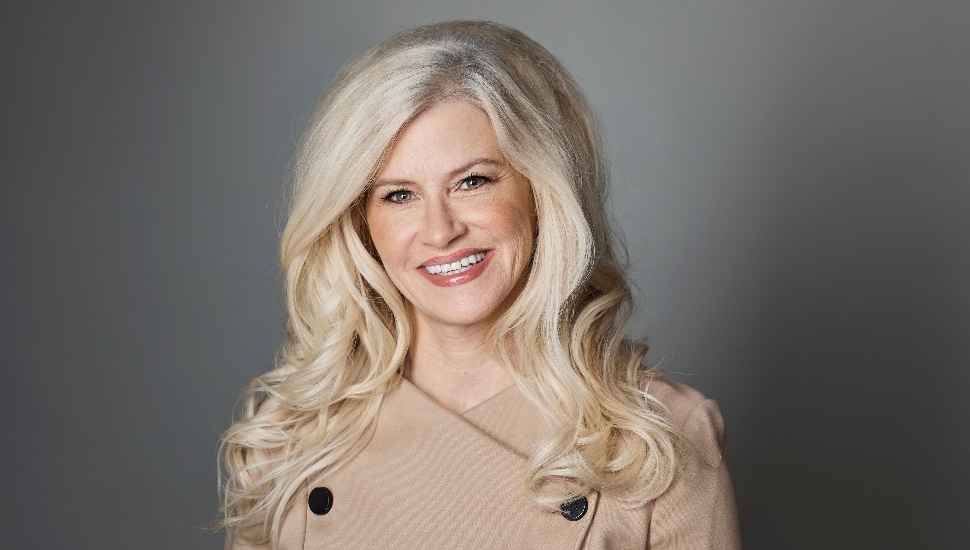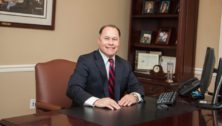Bucks County Leadership: Susan Larkin, EVP and President of Core Commercial Markets, Independence Blue Cross


Susan Larkin, EVP and president of Core Commercial Markets for Independence Blue Cross, spoke to BUCKSCO Today about growing up in Upland, where her dad was both the school principal and the mayor. She recalled working part-time at Veterans Stadium and JFK Stadium, where she got to see Phillies games and Live Aid.
Larkin discussed why she chose Widener University, which was so close she “could almost have walked,” and what it was like starting the employee benefits practice of Brokerage Professionals. After selling Brokerage Professionals, she came to IBX in 2010, where she’s working on making it easier for members to navigate the healthcare system and more affordable for the customers IBX serves.
Where were you born and where did you grow up?
I was born in Upland, in Delaware County. I have one brother, Jesse Richardson III who is four years younger than me.
What did your dad and mom do for a living?
My father was the principal of Main Street K-8, the only school in Upland, and also the mayor of the borough, so I learned, early on, the importance of community.
My mom worked inside the home.
What do you remember about growing up in Upland?
Because my father was a dedicated and passionate educator and committed public official, he was always engaged in the community.
That must have been so interesting, having your father be the mayor. What was that like growing up?
You’re right. My father had so much dedication – he would never give up. He would actually climb trees so that to ensure all students were safe at the school crosswalks. He had a reputation for going above and beyond, and I was so proud of him.
What about jobs when you were growing up?
My first job was working for Nylon Brothers as a cashier at Veterans Stadium, primarily for the Phillies games, and at JFK Stadium. I got the job through a friend of a friend. It was a lot of fun. I was able to experience the region’s enthusiasm for the Phillies, the hometown team. My favorite event was Live Aid. It was incredible – so many people.
Did you have a favorite music group growing up?
Bruce Springsteen. I got interested in him in high school. I just enjoyed his music – Thunder Road, Born to Run, and Rosalita.
Where did you end up going to college?
I went to Widener University. It was so close I could almost have walked. I wanted, an opportunity to grow in an environment with small class sizes that was close to home. And Widener, obviously, was a terrific choice.
What did you get out of Widener that helped you at that time?
I was part of the math program, originally, and then transitioned over to the accounting program. That program was very small, so there was a lot of attention to the students. I think there might have been six people in my analytics class. That level of attention was very helpful to me.
There’s an important lesson that I learned at Widener. We had a statistics teacher who said, “I’m going to challenge all of you. If you can answer this problem, you’re going to get an A in my class.”
So, I researched, researched, researched, and I found the answer in a book in the library. At the end of the semester, I didn’t have an A – I only had a B. He said to me, “You didn’t earn the A.” I said, “Oh, but I did earn an A. You said that if we were to solve this problem, we were going to get an A for the class.” He said, “Well, but your actual work didn’t deserve an A. Do you think you should receive an A?” I said, “Absolutely. You challenged us, I met the challenge, and I should have the A.”
I earned the A and indeed, received the A.
Who saw promise in you and gave you opportunities early in your career, Susan?
There’s one opportunity I consider my big break. I was hired at Watson Wyatt, a national consulting firm. On my first day, which was a Monday, the practice leader who hired me said, “Susan, my last day will be Friday.”
Obviously, I was shocked, but it turned out to be a terrific opportunity for me because it truly accelerated my consulting career. It allowed me to engage with the clients much faster than I would have if she were still there. I was out in front in Week Two. It allowed me to understand the challenges clients face and visibility into different businesses.
It’s what prompted me to start the employee benefits practice at Brokerage Professionals. I wanted to challenge the status quo on behalf of my clients We focused on how we drive down costs for our clients and how we create innovative solutions. For me, it was personal. How am I going to get my clients the lowest possible price and the best experience? That was my goal.
How did you get to Independence Blue Cross?
We sold Brokerage Professionals, and at that point, I still had a passion for helping clients. Not only did I want to continue to help clients, but I also understood what the needs were for consultants, brokers, and clients. So, I shifted from the consulting-side to the payer-side, joining IBX in August 2010. Based on all the collaboration that I had already done with IBX throughout the years, it was a perfect fit for me.
As you look into 2024, Susan, what are the opportunities and priorities you’re focused on?
We’re focused on a couple areas: improving the experience for the customer and the member, improving the technology, and updating the way that we operate.
It starts with our new platform at IBX. We’re making exciting changes in terms of increasing our capabilities and setting ourselves further apart from the competition.
The transition to the platform will enable us to act quickly so that we’re able to meet the changing needs of our customers and our members. We’ll be able to go to market with new and innovative products faster than we did before.
What other initiatives are you focused on?
It’s all about addressing our members’ needs. Let’s take behavioral health as an example. We’ve seen a 25% increase in anxiety and depression as a result of COVID-19. So, the need for behavioral health services is increasing. Despite the fact that the need is increasing, there are still so many barriers to care – access to care, i, stigma, treatment cost, and lack of knowledge.
We are offering integrated solutions to ultimately increase access, but not just increase access in terms of more providers. You need to make sure that the members are able to connect with those providers and that they have the right provider at the right time.
The second thing is around our advocacy solutions – helping our members navigate the healthcare system and educating them about their healthcare benefits so that they truly understand what the benefits are and how they navigate the system.
We have advocacy programs. When members call in, they’re able to interact with what we call healthcare champions. That champion understands their healthcare and their benefits and allows them to have their questions answered and helps them navigate to get to the resource they need.
When members are calling us, in many cases, they’re at their most vulnerable point. That’s why it’s so important for us to be an advocate for those members.
On the healthcare journey, everyone is at a different spot. We need to meet the member where they are in that journey. Whether those are digital solutions or telephonic solutions, we need to be able to provide the services that our members need at that moment.
What other healthcare trends are you dealing with in the day-to-day world at IBX?
Affordability. We view it as our responsibility to our members and our customers to ensure that healthcare is affordable. We’re trying to change the narrative from fee-for-service to paying for high-quality outcomes and providing our health care providers with the appropriate data so they understand all aspects of a member. It’s a true partnership.
It has to go beyond rates. We have to be working together, and they have to have the appropriate incentives so that we are all aligned and trying to reduce costs, improve care, and improve quality. When we think about affordability, one of the ways that we’re going to make care more affordable is that shift from fee-for-service to value-based.
And health equity is obviously a critical component. Everyone deserves an opportunity to be healthy, regardless of where they live or who they are.
Finally, Susan, what’s the best advice you ever received?
Never giving up and always pushing. It was instilled by my father – climbing trees, always finding a solution, and never giving up.
Some days are harder than others, but we have to continue to push ourselves because there’s a lot to do. My goal at Independence Blue Cross is to accomplish as much as we possibly can to make the overall experience for our members and our customers better and to continue to push to make healthcare affordable.
Connect With Your Community
Subscribe for stories that matter!
"*" indicates required fields





























